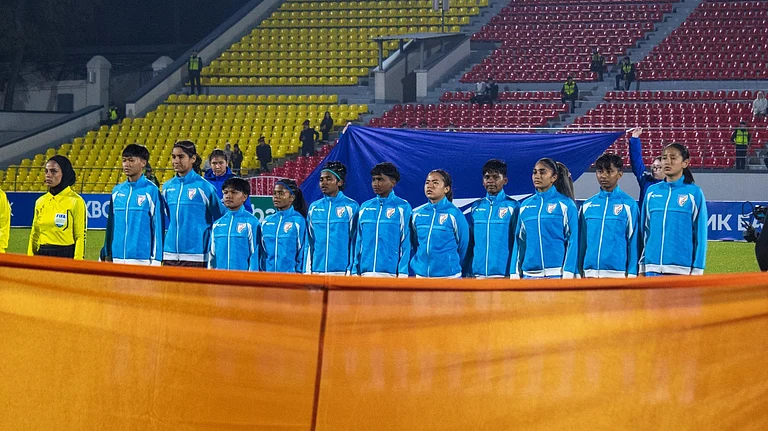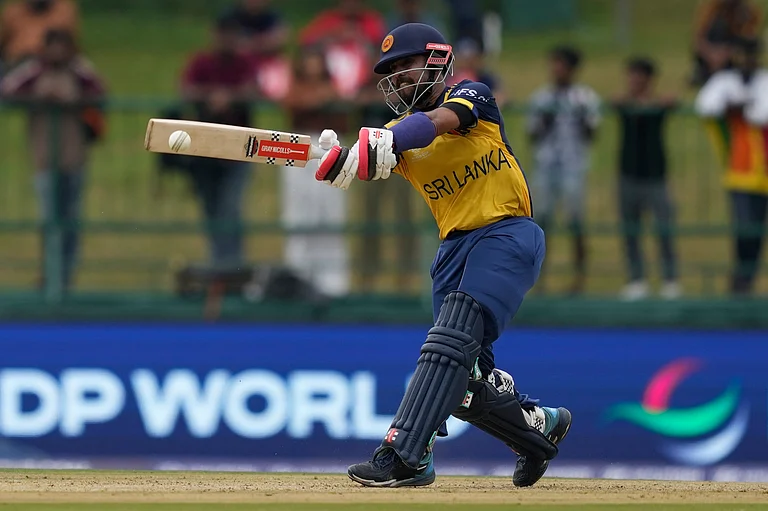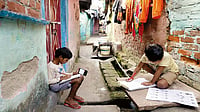
Rights of the Disabled
Thirty-nine-year-old Sumit Anand, a doctor with the North Delhi Municipal Corporation, is running from pillar to post for the past six months to get his salary and other entitlements guaranteed under the Rights of Persons with Disability (PwD) Act 2016. Despite the government guidelines exempting persons with disabilities from Covid duties, he rendered his service as in-charge of a Covid testing centre in Karol Bagh until recently. For this, he got appreciation letters from the Delhi administration. Yet, he can’t pay the rent of his Rohini flat and foot the medical bills of his elderly parents (his father has Parkinson’s disease and other ailments).
“I have no money even for my physiotherapy sessions, which are necessary to keep me going. That leaves me no option but to beg and borrow,” says Anand. “As the sole breadearner of my family, I don’t know how long I can survive like this. For the first few months, department officials kept on dilly-dallying on releasing my salary, saying it was under process. After I submitted more than 20 written reminders, they came up with faulty bills and began pressurising me to sign them. As I refused, they held back my salary.”
ALSO READ: Our Wronged Rights
In 2018, when Anand joined the municipal corporation as a doctor, he was posted at the Urban Health Centre in Karol Bagh. He became disabled later that year after an accidental surgical injury. With his back paralysed, he has limited movement in his right hand and shoulder. “My life has turned upside down. The PwD Act stipulates that people like me should get a comfortable work environment. Nobody should humiliate us for our disadvantages. But some colleagues and seniors have made insensitive remarks.”
—Prakash Kumar
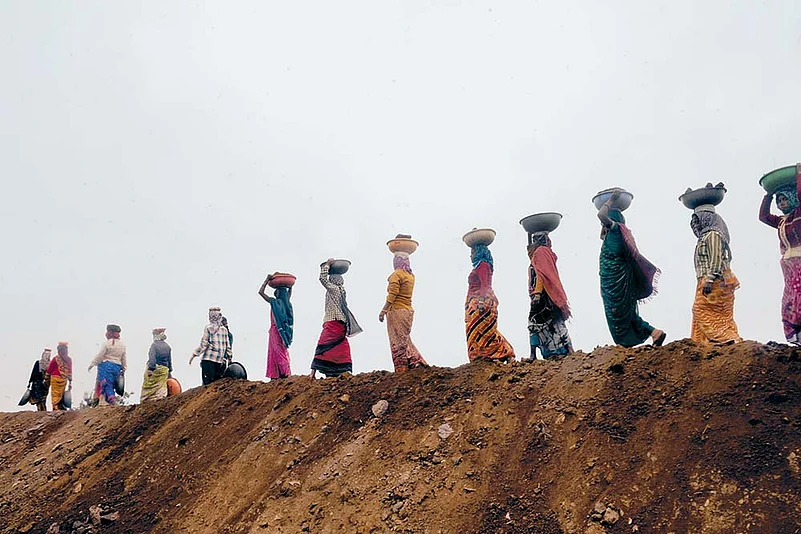
Right to Work
Right to work is the right of everyone to the opportunity of making a living by work freely chosen or accepted. The Constitution of India doesn’t mention it as a separate right, but it does guarantee a right to life (Article 21), and courts have been interpreting this fundamental right to include the right to work. According to development economist and social scientist Ritika Khera, however, the right to work is not a fundamental right, but one of the directive principles of state policy, which are non-justiciable.
In 2005, the UPA government enacted a law—the Mahatma Gandhi National Rural Employment Guarantee Act (MGNREGA)—to address the right to work, but it was limited in scope in terms of the nature of jobs, wages and number of beneficiaries per household. Khera says it is a “statutory”, not constitutional, right. Under MGNREGA, employment for 100 days is assured for one person from every rural household within 15 days of being enrolled, or else the government has to provide unemployment wages. The government fixes the unemployment wage as well as wages for different jobs in MGNREGA projects. One of the largest schemes of its kind, experts point out that it has been lacking on many fronts, including proper implementation and timely payment of wages.
ALSO READ: Tiger, Tiger Whining Bright!
While many countries recognise the right to work, their nature varies. In the US, for example, it implies the right of people to refuse to join a union or go on strike. Many countries also have social security schemes for unemployed and vulnerable people, but the rules are not uniformly applied. The focus is more on employees’ rights at work.
—Lola Nayar

Right to Marry
Does love make people adventurous? How else could 22-year old Amreen Malik scale the wall of her parents’ house at midnight to live with Mohit Nagar, now her life partner? When neighbours Mohit and Amreen had decided to tie the knot, they never imagined religion would play spoilsport. Inter-faith marriages were not commonplace in Kharauli, their small village in Meerut. Though their families knew each other for long, a Hindu-Muslim marriage was out of the question for them. Amreen’s family took her phone away and locked her up. When Mohit tried to explore legal options, his lawyers advised him to get Amreen to convert to Hinduism. “Nobody suggested the option of the Special Marriage Act,” says Mohit.
ALSO READ: Pray, Speak The Truth, Milords!
The couple eloped to Delhi in March after Amreen came to know her parents had fixed her marriage. In Delhi, though they had help from Dhanak, an NGO, Covid restrictions and red tape compounded their troubles. It was only after the Delhi High Court’s intervention in June that the special district magistrate gave them a date for marriage. They married in July.

“Religious faith shouldn’t come in the way of love. Our children will choose their life partners. Religion or caste shouldn’t be an obstacle,” says Amreen.
—Preetha Nair

Right to Education
Shivani Kumari, a class-7 student, has not studied at all since her school was closed in March during the Covid lockdown. Unlike some of her better-off school mates in the village, she does not have a mobile phone, a TV or a radio to attend her classes. “My father purchased books for me and asked me to study on my own in the morning. Sometimes I do it, but, once my parents leave for work in the fields, I go and play with other children,” says the student of the government middle school at Dwasay village in Dandkhora block of Bihar’s Katihar district.
Shivani’s brother Sawan Kumar, a class-9 student, also spends his time hanging out with friends in the village. Shivani’s father Shrawan Tanti says at least 70 per cent of the children in his village of about 1,700 households do not have access to these classes. “The school administration has made no alternative arrangement for such students. We are landless daily-wage labourers working on others’ farms for a pittance. From where do we buy a mobile phone, a TV or a radio?” he asks.
ALSO READ: In Our Roots Are Our Rights
As mid-day meals cannot be served in schools so long as they remain shut, the central government has asked all states to provide a food security allowance to children, comprising food grains, pulses, oil, vegetables and other items along with cooking cost of Rs 4.97 (primary school) and Rs 7.45 (upper primary school). “We have not got anything from the school so far,” says Shivani’s mother Poonam Devi.
—Prakash Kumar

Rights of Adivasis
Rahul Oraon is in despair these days. If the government has its way, the 40-year old’s ancestral home in Jharkhand’s Kute village will soon make way for new state assembly and secretariat buildings. A notification has been published in local newspapers and a land survey is underway. The contentious issue of land acquisition in Kute and neighbouring villages is once again in the spotlight.
“We had no inkling about it. This land belongs to our ancestors and generations have lived here. Yet, the administration is surveying the area without our permission and threatening villagers who oppose it,” says Rahul, who fears the government will take away his home without following any procedures. “They have flouted rules and regulations in the past too. We will fight to the end to keep our 10 acres of land.” That’s the sole source of livelihood for his extended family of 100.
ALSO READ: Mind The Gap
Trouble started in the 1960s when the government acquired thousands of acres of land for the public sector Heavy Engineering Corporation (HEC), he recalls. A lion’s share of the acquired land was left unused and villagers have been asking the government to return it. “We were taken for a ride. Thousands of displaced families still have neither got adequate compensation nor been properly rehabilitated,” he says. A few kilometres away from his home, the government has set up a new housing colony to rehabilitate at least 400 displaced villagers. “Those houses are too small. We will not leave our land unless we get sufficient compensation or rehabilitation. Under the land acquisition law of 2013, the government cannot acquire adivasi land by force,” he says.
—Preetha Nair

Locked Up Identity, collage on paper, 2020.
Right to Be Forgotten
In 2016, a petitioner moved the Delhi High Court seeking to remove a reference to a criminal case that kept cropping up whenever he typed his name in a Google search bar. This was because a record was freely available through an Indian legal research portal’s search engine and his plea was that it could harm his reputation or worse, career—a somewhat similar scenario to the 2014 European Court of Justice ruling, which set a global precedent on the right to be forgotten online.
The Delhi High Court is currently hearing this petition. The story goes back to a dispute among the petitioner’s family members, which led to many criminal complaints. One such complaint against the petitioner’s wife (where his name is mentioned as the direct relation) had gone before a magistrate, who directed the police to take necessary action. Eventually, the disputing family members withdrew their cases. But this court directive, which is not a judgment, but an order on an allegation, still shows up on the legal research portal and consequently on Google, says the petitioner’s advocate, Anshumaan Sahni. “Unlike court websites that require specific case details in order to search for a court order, this document is freely available online to anyone who looks up the petitioner’s name,” Sahni adds.
ALSO READ: Nailed To The Cross, Ripe For Rescue
The right to be forgotten, as a piece of legislation, is still a work in progress in India—it has been included as a section in the Personal Data Protection Bill introduced in the Lok Sabha in 2019. “This right is also germane to the Supreme Court’s privacy judgment of 2017, which effectively gives individuals power to take control of their informational privacy,” says Sahni.
—Ajay Sukumaran

Rights of Sex Workers
Ayeesha Rai has been out of work since the pandemic hit the country. As a sex worker, she is struggling for survival with mounting debts and zero income. Government schemes such as free rations are out of bounds as she is not recognised as a worker. “The pandemic has exposed our vulnerability even more,” says Ayeesha.
Fifteen years ago, after trying a few low-wage work options, she opted for sex work as it provided her a stable income to take care of her four-member family. “Sex work should be treated like any other service. We want dignity of labour,” says Ayeesha, who moved from her native West Bengal to Delhi a few years ago, as she didn’t want her family to face harassment and stigma due to her work.
ALSO READ: From The Ballad Of Indian Gaols
Having seen the exploitation and harassment meted out to sex workers by police and others, she is now at the forefront of sex workers’ struggles against discrimination and violence, and is associated with advocacy groups and rights organisations. “Society must stop seeing sex workers solely as victims or in need of rehabilitation,” she says. “Abolition or legalisation of sex work are not desirable options. Only decriminalisation will go a long way in ensuring safe working conditions.”
—Preetha Nair

Right to Same-Sex Marriage
The Supreme Court’s landmark verdict of September 6, 2018, reading down Section 377 of the Indian Penal Code (IPC) to decriminalise consensual homosexual relations was a personal victory for 36-year-old Nikesh Pushkaran. But, while the verdict has given them the freedom to be in love, Nikesh and his 32-year-old partner, Sonu MS, continue to struggle for the same fundamental and human rights enjoyed by heterosexual couples. Last January, they became the first same-sex couple to move a petition seeking changes to the Special Marriage Act so their marriage, solemnised in July 2018—two months before the Section 377 or Navtej Johar verdict—could get legal sanctity. The petition, filed in the Kerala High Court by their lawyer, Manu Srinath, triggered similar pleas in the Delhi High Court. But, with the courts only hearing urgent matters for a better part of the year due to the Covid lockdown, there has been no forward movement on these petitions.
The central and state governments, which had been issued notices to file their response to the pleas, are yet to do so. “We have been married for over two years, but when we have to fill out any government or official form, we still have to identify ourselves as ‘single’,” Nikesh says.
ALSO READ: Of Rage, Courage And Democracy
“If Sonu needs treatment at a hospital, I can’t sign consent forms for him; if we want to open a bank account or buy an insurance policy, we can’t do it as a couple. In the absence of basic rights such as the right to marry, adopt a child, open a joint bank account and inherit property, the Section 377 verdict will simply lose its meaning. It’s like the system telling us we are free to have sex, but can’t expect parity in rights with other couples. The reluctance to extend us the same rights that heterosexual people enjoy legitimises our continued othering in society that the Section 377 verdict was supposed to end.”
—Puneet Nicholas Yadav
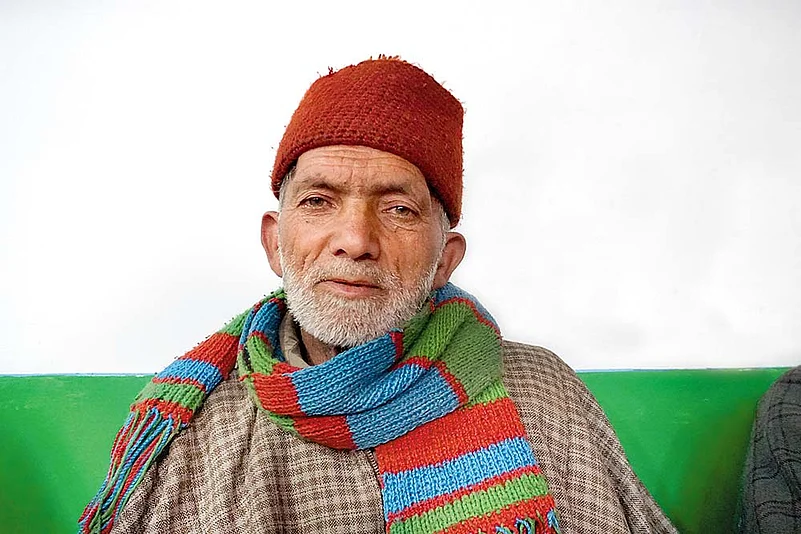
Rights to the Forest
Seventy-year-old Mohammed Sidiq Chopan is clueless about his and his children’s future. A month ago, the government of the Union territory of Jammu and Kashmir sent him a notice, asking him to vacate their land in Negu, a village on a forested hilltop in central Kashmir’s Budgam district. According to the notice, their household is among more than 100 in the village that are “unauthorised occupants of forest land”, and that they all have to vacate their lands within 10 days of receiving the notice. “We and our forefathers have been living in the village for more than 150 years. Suddenly we are being told to vacate our lands and cut down our walnut and apple trees. As our homes are also on these lands, they are actually asking us to leave our homes. We are poor people. We don’t know where to go and what to do,” he says.
The Chopans are known as the shepherds of Kashmir, their traditional occupation, though many of them also have to work as daily-wage labourers to make ends meet. The government claims to retrieve forest land “under the unauthorised occupation of people”, but experts say the drive is in violation of the Forest Rights Act 2006.
—Naseer Ganai
ALSO READ:








